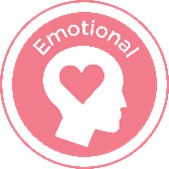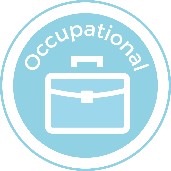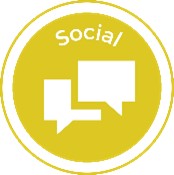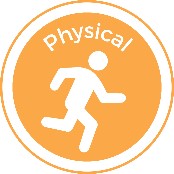August is National Wellness Month! Our wellness is about how all aspects of our lives come together and influence our overall state of well-being. It is not just the absence of a mental illness. Overall wellness is something that we can all consistently strive for. At Miracles, we think total wellness is important and are committed to helping you improve your well-being for a happier and healthier lifestyle.
Because our mental wellness is determined by the ways in which different aspects of our lives come together, it is broken up into 8 dimensions. To gain a better understanding of your current state of well-being and how you can work to improve it, we will provide a breakdown of each dimension. You may realize that, while you have achieved wellness in some dimensions, other dimensions may be negatively affecting your overall wellness. These can be focus areas for personal improvement.
Emotional Wellness Our awareness, understanding, and acceptance of our emotions, as well as our ability to m anage challenges and change. Being emotionally well allows us to identify and accept how we are feeling, then decide how we want to respond. We can express our feelings without any constraints, which leads to a happier life.
anage challenges and change. Being emotionally well allows us to identify and accept how we are feeling, then decide how we want to respond. We can express our feelings without any constraints, which leads to a happier life.
How to achieve it: Accept that emotions occur and allow them to be felt; Embrace a positive outlook; Practice mindfulness; Be grateful; Seek help from others when needed; Develop coping skills or ways to manage stress
Occupational Wellness Our ability to achieve a balance between work and leisure in a way that promotes  enrichment and personal satisfaction. The way we feel about our work affects our overall well-being. When we do not feel a sense of enjoyment or fulfillment from our careers, we can become depressed. When we are content with our careers, we experience greater proficiency, productivity, commitment, energy, & enthusiasm.
enrichment and personal satisfaction. The way we feel about our work affects our overall well-being. When we do not feel a sense of enjoyment or fulfillment from our careers, we can become depressed. When we are content with our careers, we experience greater proficiency, productivity, commitment, energy, & enthusiasm.
How to achieve it: Set realistic goals and work toward them; Reflect on yourself and your needs; Seek motivating and interesting work; Practice open communication and conflict management with colleagues; Find ways to enjoy daily tasks; Focus on the positives in your job
Social Wellness How we interact with others. It is about how connected we feel to our community and our ability  to maintain healthy relationships. It is important for us to have a supportive social network to rely on. The quality of our relationships affects our identity, self-esteem, & other dimensions of wellness. Strong social wellness also builds emotional resilience.
to maintain healthy relationships. It is important for us to have a supportive social network to rely on. The quality of our relationships affects our identity, self-esteem, & other dimensions of wellness. Strong social wellness also builds emotional resilience.
How to achieve it: Reflect on yourself and your social needs; Make connections; Stay in touch with supportive family and friends; Practice self-disclosure; Join a club or organization; Balance personal and social time; Create healthy boundaries.
Financial Wellness Our ability to understand and successfully mange financial expenses. Financial wellness  involves being informed about financial concerns and prepared for financial changes. Finance is a common source of stress, anxiety, and fear. Financial wellness allows us to enjoy our lives, while living within our means. Investing in our financial wellness now can help us be prepared for future financial constraints and life’s challenges.
involves being informed about financial concerns and prepared for financial changes. Finance is a common source of stress, anxiety, and fear. Financial wellness allows us to enjoy our lives, while living within our means. Investing in our financial wellness now can help us be prepared for future financial constraints and life’s challenges.
How to achieve it: Find your why- what motivates you financially?; Keep organized records of your finances; Plan ahead and set budget goals; Limit impulsive spending; Avoid multiple lines of credit; Don’t put it off- identify problems before they start!



 experiences, problem solve, think creatively and expand our knowledge. Intellectual wellness encourages learning, exploration, and curiosity. When we are curious, we are motivated to try new things, improve skill sets, challenge ourselves, and become more open-minded.
experiences, problem solve, think creatively and expand our knowledge. Intellectual wellness encourages learning, exploration, and curiosity. When we are curious, we are motivated to try new things, improve skill sets, challenge ourselves, and become more open-minded. environment. When we are more environmentally aware, we understand how our daily habits affect the environment. Environmental wellness encourages us to respect our environment and practice healthy habits that promote a healthy environment. Feeling more in control of our environment can also reduce
environment. When we are more environmentally aware, we understand how our daily habits affect the environment. Environmental wellness encourages us to respect our environment and practice healthy habits that promote a healthy environment. Feeling more in control of our environment can also reduce  responsibility for our own health, being more aware of our physical well-being, and establishing a routine of making healthy choices. When we are physically well, we can balance physical activity, nutrition, and our mental well-being, leading to greater energy & functioning, and a reduced risk for
responsibility for our own health, being more aware of our physical well-being, and establishing a routine of making healthy choices. When we are physically well, we can balance physical activity, nutrition, and our mental well-being, leading to greater energy & functioning, and a reduced risk for  Spiritual wellness allows us to live with meaning and purpose, appreciate life experiences, and balance our inner self with the outside world. Being in tune with our spiritual selves can include believing in a religious faith, but it can also just mean learning about ourselves and how we see ourselves in the world.
Spiritual wellness allows us to live with meaning and purpose, appreciate life experiences, and balance our inner self with the outside world. Being in tune with our spiritual selves can include believing in a religious faith, but it can also just mean learning about ourselves and how we see ourselves in the world. private practice sectors. This work has ranged from providing counseling and support to birth parents, adoptive parents and adoptees in the adoption field, to working with those infected with HIV/AIDS, to teaching undergraduate psychology courses, and now to private practice where she works with adolescents, individuals, couples, and families. Sarah truly loves her work and counts it as a privilege to come alongside clients in their most painful and celebratory moments of life. She has three children and has lived in the Lake Norman area for eight years.
private practice sectors. This work has ranged from providing counseling and support to birth parents, adoptive parents and adoptees in the adoption field, to working with those infected with HIV/AIDS, to teaching undergraduate psychology courses, and now to private practice where she works with adolescents, individuals, couples, and families. Sarah truly loves her work and counts it as a privilege to come alongside clients in their most painful and celebratory moments of life. She has three children and has lived in the Lake Norman area for eight years.

